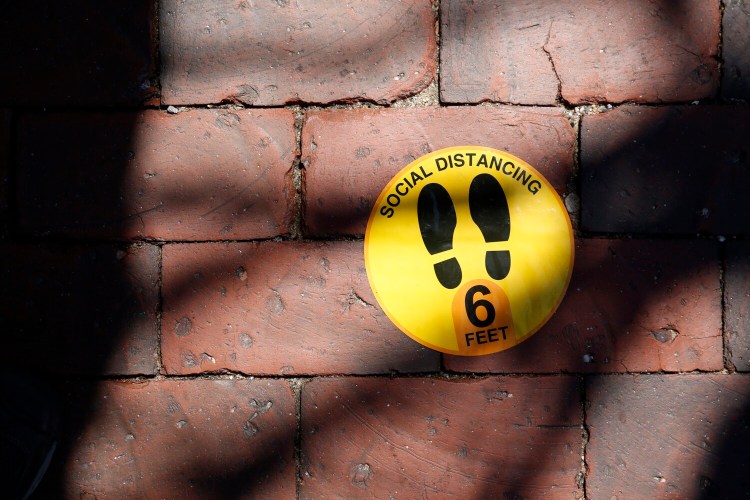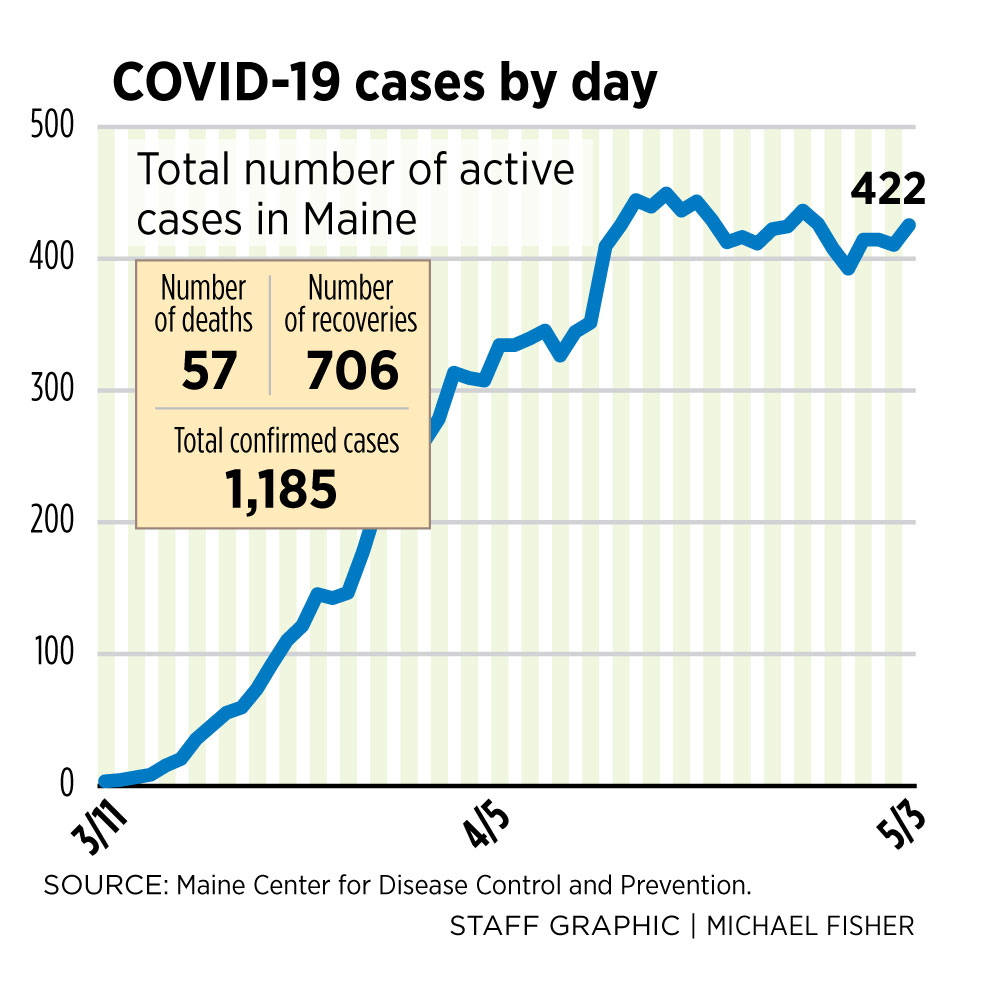The Maine Center for Disease Control and Prevention on Sunday reported 33 new cases of the novel coronavirus and one more death, raising the statewide totals to 1,185 confirmed cases and 57 deaths.
Subtracting the numbers of patients who have recovered – 706 – and died, there were 422 active cases on Sunday, an increase of 15 active cases over the previous day.
The deceased person was a man in his 90s from Cumberland County.
Sunday’s totals come as Mainers debate how best – and especially how fast – to reopen the state’s economy and state Republican leaders are demanding the removal of Gov. Janet Mills’ emergency powers.
Select businesses around Maine reopened on Friday, provided they met state guidelines for safety. Hair salons, pet groomers, auto dealerships and others were swarmed with demand. Some businesses had schedules booked weeks out.
Despite easing restrictions in some areas, Mills announced last week that Mainers would be required to wear masks or cloth face coverings in public areas where social distancing is difficult, such as the grocery store. The executive order took effect Friday.
Simultaneous economic and public health concerns have led Mills to defend her handling of the crisis from both sides. She’s trying to address worries that businesses are reopening as Mainers with COVID-19 are still dying, but also that the economy isn’t restarting fast enough to save people’s livelihoods.
The Maine CDC director, Dr. Nirav Shah, said Maine can double or triple its testing capacity in the coming weeks, but other public health officials contend that would only get Maine testing to the bare minimum rate needed to detect most new infections.
Last week, Sunday River Brewing Co. owner Rick Savage announced he would defy Mills’ public health orders by opening his Bethel brewpub for dine-in customers, which he did on Friday. Later that same day, however, state officials entered the restaurant and seized Savage’s health license, also invalidating his liquor license and forcing him to capitulate.
On Saturday in Augusta, more business owners, including Savage, protested the reopening plan, which they contend is too slow. Later that evening, Republican leadership released a statement calling for lawmakers to revoke Mills’ emergency powers and reopen the state’s economy.
The political fallout occurs as Maine makes gains on the virus. A Portland Press Herald/Maine Sunday Telegram analysis last week of infection data suggested that social-distancing measures are working to slow the spread of COVID-19, the disease caused by the coronavirus. Maine has among the lowest infection rates in the country, and is in the lower tier of deaths per 100,000 people.
As of Friday, there were 83.9 cases per 100,000 people in Maine, 138.3 in Vermont and 323.7 around the United States. New York state had the highest infection rate: 1,530.6 cases per 100,000 people.
Still, Maine is working with smaller numbers compared to more populous states, and so small fluctuations can have an outsize effect. And experts warn that, despite the progress the state has made, any undue relaxing of safety measures could let the virus come back.
Even as the overall outbreak appeared to be leveling off, certain communities in Maine were at higher risk. Long-term care facilities have seen a spate of outbreaks and deaths in recent weeks. Former residents at the Maine Veterans’ Home in Scarborough, where 11 veterans and one spouse of a veteran have died, account for over one-fifth of Maine’s deaths attributed to COVID-19.
Last week, the Tyson Foods poultry processing plant in Portland reported that eight workers had tested positive for COVID-19. All 400 employees now are receiving tests. The company has idled production for three days – Saturday, Sunday and Monday – as testing and safety measures take effect.
County by county on Sunday, there were 56 cases in Androscoggin County, five in Aroostook, 549 in Cumberland, 29 in Franklin, 10 in Hancock, 105 in Kennebec, 16 in Knox, 13 in Lincoln, 15 in Oxford, 84 in Penobscot, one in Piscataquis, 19 in Sagadahoc, 17 in Somerset, 49 in Waldo, two in Washington and 215 in York. Of Sunday’s 33 new confirmed cases, 22 were in Cumberland County.
Public health officials have repeatedly cautioned that case numbers are likely being undercounted because of limited testing supplies. All Mainers should take precautions as though the virus is already in their surroundings, regardless of confirmed numbers, they say.
As of Sunday, 33 people were hospitalized in Maine with confirmed cases of COVID-19. Of those, 18 were in critical care and 10 on ventilators. Across Maine, 180 of 324 intensive care unit beds were available; 285 of 316 ventilators were available, and the state also has 395 alternative ventilators.
By age as of Sunday, only 2.2 percent of patients with COVID-19 in Maine were under 20, while 10.8 percent were in their 20s, 10.7 percent were in their 30s, 14.6 percent were in their 40s, 19.3 percent were in their 50s, 16.9 percent were in their 60s, 13.2 percent were in their 70s, and 12.3 percent were 80 or older.
Women continued to be infected at a higher rate than men, making up 53.8 percent of confirmed cases.
Staff Writer Rob Wolfe contributed to this report.
Send questions/comments to the editors.





Success. Please wait for the page to reload. If the page does not reload within 5 seconds, please refresh the page.
Enter your email and password to access comments.
Hi, to comment on stories you must . This profile is in addition to your subscription and website login.
Already have a commenting profile? .
Invalid username/password.
Please check your email to confirm and complete your registration.
Only subscribers are eligible to post comments. Please subscribe or login first for digital access. Here’s why.
Use the form below to reset your password. When you've submitted your account email, we will send an email with a reset code.